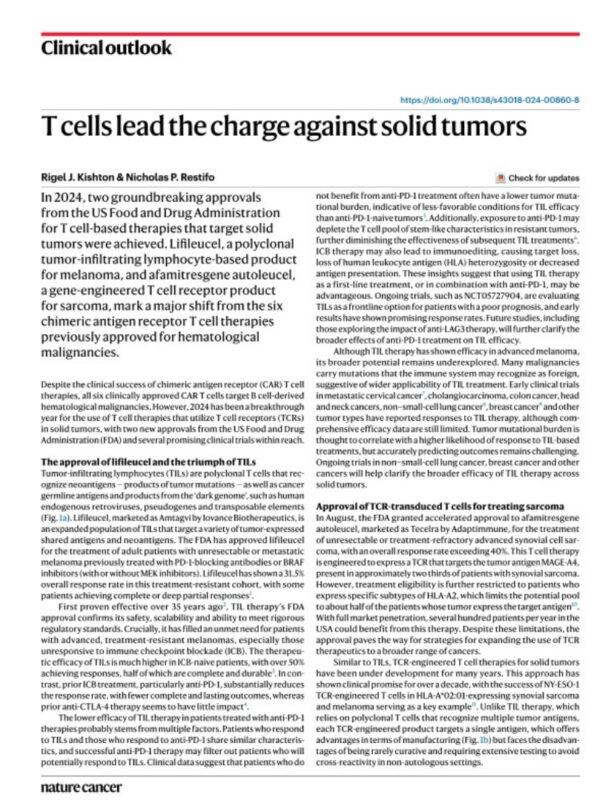Nicholas Restifo, Co-founder and Chief Scientist at Marble Therapeutics, shared on LinkedIn:
“A Breakthrough Year for T Cells.
This year has been transformative for T cell therapies in the fight against cancer, as reviewed by Rigel Kishton and me in today’s issue of Nature Cancer. With three FDA approvals, 2024 has underscored the clinical power of T cells — living immunotherapies capable of achieving results where all other treatments fail.
Key Approvals of 2024
-> Lifileucel (Amtagvi): The first TIL-based therapy for unresectable/metastatic melanoma, approved in February.
-> Afamitresgene (Tecelra): The first TCR-engineered therapy for solid tumors, approved in August for synovial sarcoma.
-> Obecabtagene (Aucatzyl): The 7th CAR T therapy for B cell hematologic malignancies, approved last month.
These therapies are clinically remarkable. Engineered from a patient’s own T cells, they deliver life-changing responses for patients with no other options. I’ve had the privilege of contributing to these advancements and witnessing their profound impact.
The Promise of TIL Therapies
TIL-based therapies hold transformative potential. By recognizing tumor neoantigens — expressed mutations, cancer germline antigens, and even “dark genome” products like HERVs or pseudogenes — T cells can achieve durable, complete responses.
CD4+ and CD8+ T cells bring the ability to directly or indirectly eliminate tumors where traditional therapies fall short.
Despite these advances, the oncology capital markets remain skeptical. Cell therapy companies face immense challenges:
-> Development Costs: Complex manufacturing, high trial expenses, and stringent regulations.
-> Safety Concerns: Risks like cytokine release syndrome and lymphodepletion-associated toxicities.
-> Commercialization Hurdles: High prices, uncertain reimbursement, and cumbersome logistics.
The result? T cell-based immunotherapies can land with a thud from investors concerned about small target markets and costly treatment delivery.
Technology as a Solution
The future of T cell-based therapies looks brighter with technological innovation:
-> AI/ML for Transcriptomics and Genomics: Personalizing T cell products for individual patients.
-> Cheaper Sequencing: Accelerating tumor neoantigen target discovery.
-> Improved Culture Methods: Enhancing T cell stem cell qualities for durable efficacy.
While T cell engagers and bispecific antibodies gain investor interest for their transient solid tumor activity, these treatments are rarely curative. TIL therapies, on the other hand, stand on the cusp of delivering transformative, long-term responses in patients with common solid tumors.
The journey isn’t easy—financial skepticism, logistical hurdles, and scientific complexity remain—but the horizon for T cell therapies is filled with extraordinary possibility.
Here’s to the progress we’ve made and the breakthroughs that lie ahead.”



